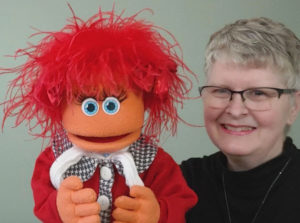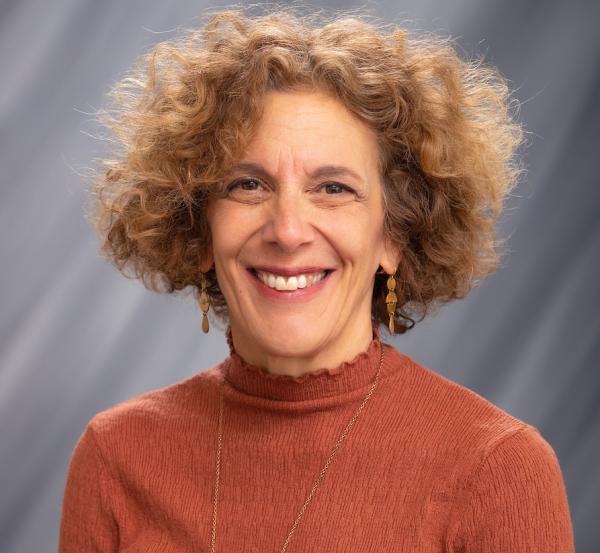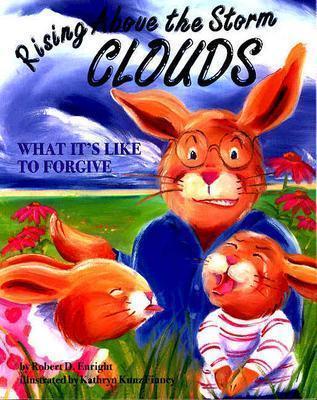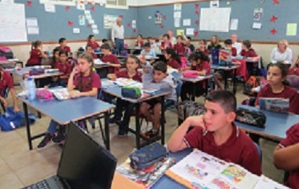News
‘Puppets for Peace’ video presentations now featured in Pre-K and Kindergarten IFI curriculum
Mary Lou Coons, who was recognized with a Partnership Achievement Award in December 2022 by the International Forgiveness Institute (IFI), is a ventriloquist and the founder of Puppets for Peace. She has recently produced, together with her red-haired puppet Lily, video recordings of all the children’s books referenced and used in Dr. Enright’s Pre-K and Kindergarten IFI curriculum guides including:

Mary Lou Coons, Founder of ‘Puppets for Peace’, and her red-haired puppet, Lily.
PRE-K
- You Are My I Love You
- No Matter What
- Fill a Bucket
- I Love My New Toy
- A Birthday for Frances
- Papa, Do You Love Me?
KINDERGARTEN
- I Love You Stinky Face
- Little Fur Family
- It’s Not Easy Being a Bunny
- Will You Forgive Me?
- The Runaway Bunny
The videos, which range between roughly three to six minutes, include an introduction by Lily with Mary Lou reading the entire book, word for word. She also produced a 10-minute video recording of Dr. Enright’s Rising Above the Storm Clouds (part of the 4th-grade curriculum program), the only video version of the book available anywhere.
The IFI offers teachers and others who obtain curriculum guides a directory of online video recordings that can supplement the guides and be shown to students who are learning about forgiveness. We are extremely grateful to Mary Lou that we can now include her ‘Puppets for Peace’ videos as supplements for the Pre-K, K, and 4th-grade curriculum!
‘Peace in the Wake of Pain’ highlights the science – and healing potential – of forgiveness
The Summer 2023 edition of On Wisconsin, the University of Wisconsin’s magazine for communicating with alumni and the general public, features a full-length interview with Dr. Robert Enright, highlighting how he developed the study of forgiveness over his years in academia to contribute something of real value to people who are suffering.

Dr. Robert Enright
Dr. Enright, International Forgiveness Institute co-founder, shares how an academic crisis led to his studying of forgiveness. As he is quoted in the article, he began to wrestle with the question, “What happens to people when they’re thrown to the mat of life by others being unfair? How do they get out of that?”
The article, entitled ‘Peace in the Wake of Pain’, goes on to share how Dr. Enright and his team have helped abused youth, prison inmates, and others who have experienced deep pain and anger discover healing and peace through entering into the process of forgiveness.
The On Wisconsin feature is a wonderful opportunity for many people to hear the good news about forgiveness and its potential for healing, peace, and restoration for individuals, families, and communities. Please share generously!
“Over the past 35 years, Enright and his colleagues have worked almost exclusively with people who have been deeply traumatized and are looking for a way out of their pain,” according to the article. “Enright says people who have suffered deeply for a long time — victims of domestic abuse, incest, and political violence, for example — are often the most likely to commit to the difficult process of forgiving the injustices done to them.”
Forgiveness Education Is Peace Education
A 10-week forgiveness education curriculum can be an important component of peace education for students according to a newly published study by Dr. Suzanne Freedman, a Professor of Educational Psychology at the University of Northern Iowa.

Dr. Suzanne Freedman, Professor, Co-chair of the College of Education Diversity, Equity & Inclusion Committee, University of Northern Iowa.
Dr. Freedman, a long-time research associate of International Forgiveness Institute co-founder Dr. Robert Enright, conducted the project with three classes of fifth graders. The resulting study was published in the April issue of Peace and Conflict: Journal of Peace Psychology, an American Psychology Association (APA) publication.
The forgiveness education curriculum used for the project was jointly developed by Drs. Freedman and Enright and employed the Process Model of Forgiveness developed by Dr. Enright. The project incorporated Social-Emotional Learning (SEL) approaches that taught students healthy ways to express anger and other feelings, understand the perspective of others, and practice empathy and kindness.
This article illustrates how forgiveness education can be infused into the curriculum and the importance and benefits of doing so. Readers will learn more about forgiveness as well as how promoting forgiveness as a virtue to students can reward the forgiver, the forgiven, and society at large.
Dr. Suzanne Freedman
“Results from this study illustrate that a 10-week forgiveness education curriculum can be an important component of peace education for fifth grade students,” according to the published report. “Students showed increased forgiveness toward a specific offender and increased knowledge about forgiveness after receiving the education, and students’ verbal reports illustrate that they enjoyed and benefited from this specific curriculum using children’s literature.”
Learn more:
Read the full study – “Forgiveness education as a form of peace education with fifth-grade students: A pilot study with implications for educators.”
The Value of Forgiveness – An article outlining the benefits of forgiveness and the forgiveness education work of Dr. Suzanne Freedman at the University of Northern Iowa.
It’s Okay to Not Be Okay – A guest blog by Dr. Freedman on the importance of helping teens understand the role forgiveness plays in their psychological health.
Greater Good in Education Promotes Forgiveness/Character Education – An internationally-acclaimed organization has created an entire “best practices” forgiveness component for educators based on Dr. Freedman’s 5th grade curriculum guide.
The Psychology of Interpersonal Forgiveness – In this article written for SEL in Action, a publication for educators, Dr. Freedman debunks several misconceptions about forgiveness.
Study in Greece and Saudi Arabia Reveals Teacher Attitudes on Forgiveness and Cross-Cultural Differences
Because school-based Forgiveness Education programs have been rigorously and repeatedly tested, there is little question about the effectiveness of such programs to provide significant reductions in student anger and depression as well as meaningful increases in tendency to forgive.
What is less certain—and, to date, barely studied—is what role a teacher’s personal understanding of forgiveness plays in influencing those outcomes. A just-completed scientific analysis, conducted by an international team of forgiveness researchers under the direction of Dr. Robert Enright, is providing some answers to that question.
“Teachers’ Views of Forgiveness Education: A Cross-Cultural Examination in Greece and Saudi Arabia” was published this month in the journal FIRE: Forum for International Research in Education (Vol. 7, Issue 3, 2023, pp. 99-116). FIRE publishes “internationally comparative education data and evidence-based achievement studies.”
Dr. Peli Galiti, Director of the IFI Greek Forgiveness Education Program, has trained more than 1,000 teachers in Greece to use the Forgiveness Education Program which is now being taught to more than 10,000 students there. (Image by Rawpixel.com)
The new study not only analyzed teachers’ views of forgiveness education but also explored cross-cultural similarities and differences with a total of 134 teachers participating—76 Greek and 58 Saudi. The two countries have unique and rich cultural histories and influences: Greece is part of the Eurozone and Eastern Orthodoxy is its main religion; Saudi Arabia is an Arab state, and its main religion is Islam.
Study participants completed a comprehensive online survey asking about the meaning of forgiveness, topics they felt should be included in forgiveness education, and their perceptions of the benefits and challenges of teaching forgiveness education. The questionnaires were then analyzed using a variety of assessment tools including two-tailed proportional testing.
Comparing Greek and Saudi Arabian teachers’ perspectives resulted in these findings:
- More Saudi than Greek teachers viewed forgiveness as reconciliation.
- More Saudi than Greek teachers viewed forgiveness as excusing an unjust act.
- More Greek than Saudi teachers viewed forgiveness as a merciful act.
- More Greek than Saudi teachers viewed calmer students as a benefit of forgiveness education.
- More Greek than Saudi teachers viewed conflict resolution skills to be a benefit of forgiveness education.
- More Saudi than Greek teachers thought students would take advantage of forgiveness.
“Those results reflect not only the cultural differences of the participants but also the fact that 31 of the Greek teachers had previously received several hours of forgiveness education training while none of the Saudi teachers had specific training or forgiveness teaching experience,” Dr. Enright observed. “This ground-breaking study is important because it emphasizes the influence teachers’ views can have on forgiveness education.”
Dr. Enright, co-founder of the International Forgiveness Institute (IFI), added that studies like this one can help him and other forgiveness researchers tailor teacher training and customize curricula to better reflect effective implementation techniques.
The Kingdom of Saudi Arabia, a country of 27 million people, has the world’s largest petroleum reserves and is the world’s largest oil exporter. (Image by Rawpixel.com)
In 2002, Dr. Enright initiated a forgiveness education program in Belfast, Northern Ireland that has now been in operation for over 20 consecutive years. His Belfast work is featured in the award-winning documentary The Power of Forgiveness.
Dr. Enright started similar programs in Liberia, West Africa in 2011 and in Israel-Palestine in 2013. He now has such programs in more than 30 regions around the world and an IFI Branch Office in Pakistan at the Government College University Lahore (GCU-Lahore, Pakistan).
In addition to Dr. Enright, the cross-cultural study was conducted by Peli Galiti, John Klatt, Nahlah Mandurah, and Lai Wong—all affiliated with the University of Wisconsin-Madison. Author bios and the complete teacher survey instrument are included in the study document.
Read the full study: Teachers’ Views of Forgiveness Education.
Dr. Enright’s Book Named One of “Best Children’s Books About Forgiveness”
As it nears its 20th anniversary of publication, Dr. Robert Enright’s only children’s book, Rising Above the Storm Clouds: What It’s Like to Forgive, has been selected for inclusion in an exclusive list of “the best children’s books about forgiveness.”
The honor was bestowed on Dr. Enright’s book by Bookroo—the world’s largest website platform dedicated entirely to children’s books. The website, with more than 30,000 children’s books in its curated digital collection, says its goal is “to make it convenient for parents and magical for kids to fall in love with reading!”
 Rising Above the Storm Clouds was written by Dr. Enright in 2003 and was published the following year by Magination Press, the publishing arm of the American Psychological Association. It is a 32-page book crammed with colorful full-page illustrations by Kathryn Kunz Finney, a popular artist and portraitist specializing in children and pets.
Rising Above the Storm Clouds was written by Dr. Enright in 2003 and was published the following year by Magination Press, the publishing arm of the American Psychological Association. It is a 32-page book crammed with colorful full-page illustrations by Kathryn Kunz Finney, a popular artist and portraitist specializing in children and pets.
In the book, a brother and sister who are angry with each other learn from their father the benefits of forgiveness through a series of symbolic images. Together they see what it’s like to forgive and discover that forgiveness can feel good to the forgiver, perhaps even more so than to the one forgiven.
The book also includes a note to parents from Dr. Enright, co-founder of the International Forgiveness Institute (IFI), in which he defines forgiveness, differentiates it from reconciliation, and guides parents in helping their children learn how to forgive. He also highlights in that note why children should learn to forgive:
“Forgiveness has a way of cutting through our angers and resentments to give all involved a fresh start. As you forgive, you are set free from the prison of resentment. As you offer forgiveness to another person, he or she has the chance to begin anew with you, trying to be more civil, more respectful, more kind. Those around you benefit because you are less likely to carry your anger into other situations. You are less likely to displace your anger onto those who don’t deserve it.”
According to Bookroo, children’s literature offers an ideal medium for helping children develop the ability to forgive their friends, family members, and others. That sentiment is echoed by another children’s book website called the Third Hour which is funded by the More Good Foundation. Third Hour has Rising Above the Storm Clouds listed 3rd on its top ten checklist of “books that teach children—from toddlers to tweens—the importance of forgiveness.”
Both the Bookroo and Third Hour websites include these other popular children’s books on their “Best Forgiveness Books” list:
- The Year the Swallows Came Early, Kathryn Fitzmaurice
- I am Extremely Absolutely Boiling, Lauren Child
- Will You Forgive Me?, Sally Grindley and Penny Dann
- Enemy Pie, Derek Munson
- The Forgiveness Garden, Lauren Thompson

Students in more than 30 countries around the world– like these at Mar Elias Elementary School in Ibillin, Israel (near Nazareth) — learn about forgiveness through the IFI’s Forgiveness Education Program.
All those children’s forgiveness books are not only on the best books lists but have also been recognized for their positive moral values by Dr. Enright. Because of that, they are all included as supplemental reference materials in one or more of his Forgiveness Education Curriculum Guides that are available for pre-kindergarten through grade 12 students.
Rising Above the Storm Clouds is incorporated into both the 3rd and 4th grade curriculum guides as part of that IFI Forgiveness Education Program. The book is available in both hard cover and paperback versions for as little as $3.01 (used condition) on various websites including amazon.com, amazon.com.uk, ThriftBooks.com, and ebay.com. It is also available in a 10-minute online video version produced and narrated by Mary Lou Coons, founder of the Puppets for Peace Foundation.



